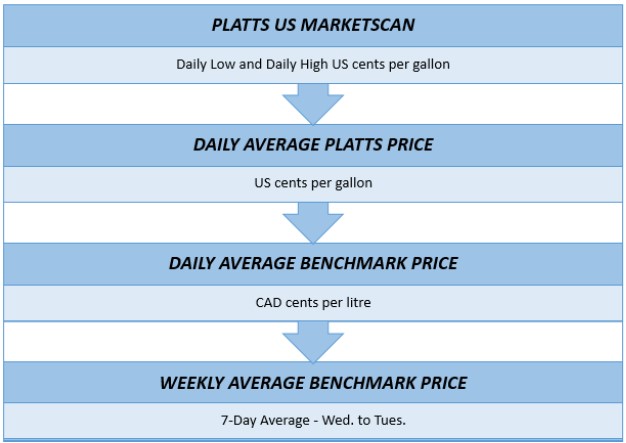Calculation of Benchmark Prices
The benchmark price is required to be calculated using the average of the average of the daily high and low product prices for the reported benchmark since the last adjustment of maximum prices. The reported prices are converted to Canadian cents per litre from US cents per gallon. For regularly scheduled adjustments a 5-day average is used. For example, the weekly Friday adjustment of the maximum prices for gasoline must reflect the average of the average of the daily high and low Argus Media UNL 87 data for the previous Thursday to Wednesday, converted to Canadian cents per litre. Pursuant to section 2(a.1)(ii) and 14(2.1) of the Regulations, the benchmark price for mid-grade and premium gasoline is based on the UNL 87 benchmark price plus 3.0 cpl and 6.0 cpl, respectively. In the case of holidays, the most recently reported daily data may be used. Since maximum prices are based on an average of market prices, the established maximum prices may at times be different than the daily benchmark prices at the time of an adjustment.

Sources for Benchmark Prices
Benchmark prices are calculated using the benchmark sources set out in the regulations. For all regulated products except propane, the source of the daily data for benchmark prices is Argus Media, an internationally recognized and accepted source for fuel pricing information. As this information is provided through a subscription service, the Board is prohibited from releasing the daily information. The benchmark sources the Board is required to use can be found here.
The benchmark used to calculate the maximum price for a motor or heating fuel reflects the product supplied which may vary by region and/or the time of year. For example, the benchmark price for stove oil heating fuel in Western Labrador is based on 100% ultra low sulfur kerosene (ULSK). The benchmarks used to calculate maximum prices are as set out below.
Benchmark Sources and Blending Methodology |
Product |
Reporting Data Source |
Product Price Assessment |
Blend Methodology |
Winter Blend |
Spring Blend |
Regular
Gasoline |
Argus Media |
New York Harbor UNL 87 |
100% UNL 87 Year Round |
Mid-Grade
Gasoline |
Argus Media |
New York Harbor UNL 87 |
100% UNL 87 Year Round |
Premium
Gasoline |
Argus Media |
New York Harbor UNL 87 |
100% UNL 87 Year Round |
Diesel Motor
Fuel (Island) |
Argus Media |
New York Harbor ULSD
New York Harbor ULSK |
25% ULSD
75% ULSK |
100% ULSD
|
Diesel Motor
Fuel
(Zones 13 and 13a) |
Argus Media |
New York Harbor ULSD
New York Harbor ULSK
|
100% ULSK |
25% ULSD
75% ULSK |
Furnace Oil
Heating Fuel(Island) |
Argus Media |
New York Harbor ULSD
New York Harbor ULSK |
25% ULSD
75% ULSK |
100% ULSD |
Stove Oil
Heating Fuel
(Zones 13 and 13a)
|
Argus Media |
New York Harbor ULSK |
100% ULSK Year Round |
Propane
Heating Fuel |
Oil Price Information Service |
Sarnia Propane (Weekly Average) |
Sarnia Propane Price Year Round |
|
|
Navigation Menu
Current Pricing
Historical Pricing
How Maximum Prices are Set
Pricing Components
Benchmark Prices
Carbon Price Adjustment
Total Allowed Mark-ups
Zone Differentials
Taxation
Zones
Timing of Adjustments
Weekly Adjustments
Extraordinary Adjustments
Suspension of Adjustments
History of Regulation
2022-2023 Review
Applications and Proceedings
Orders
Zone Map
Questions and Answers
|

